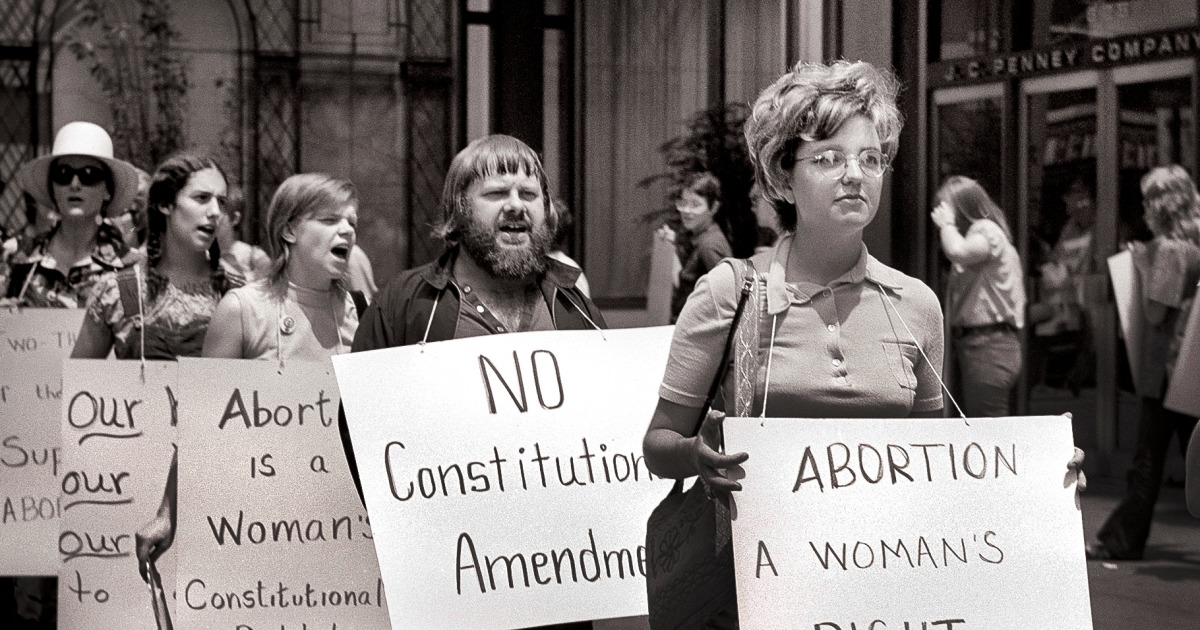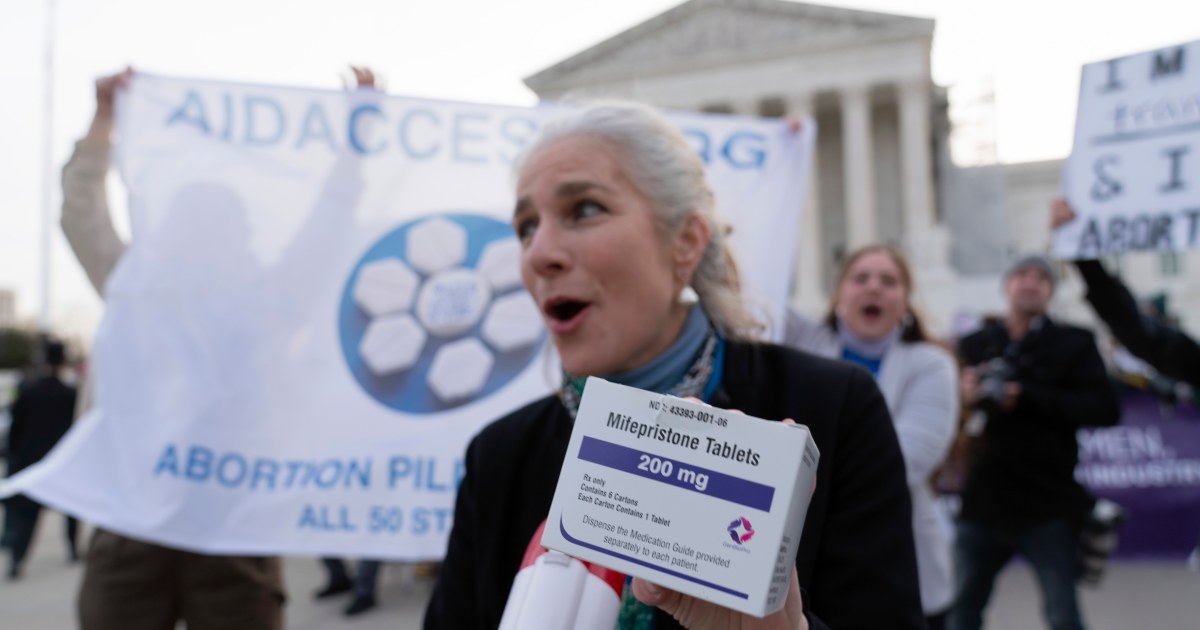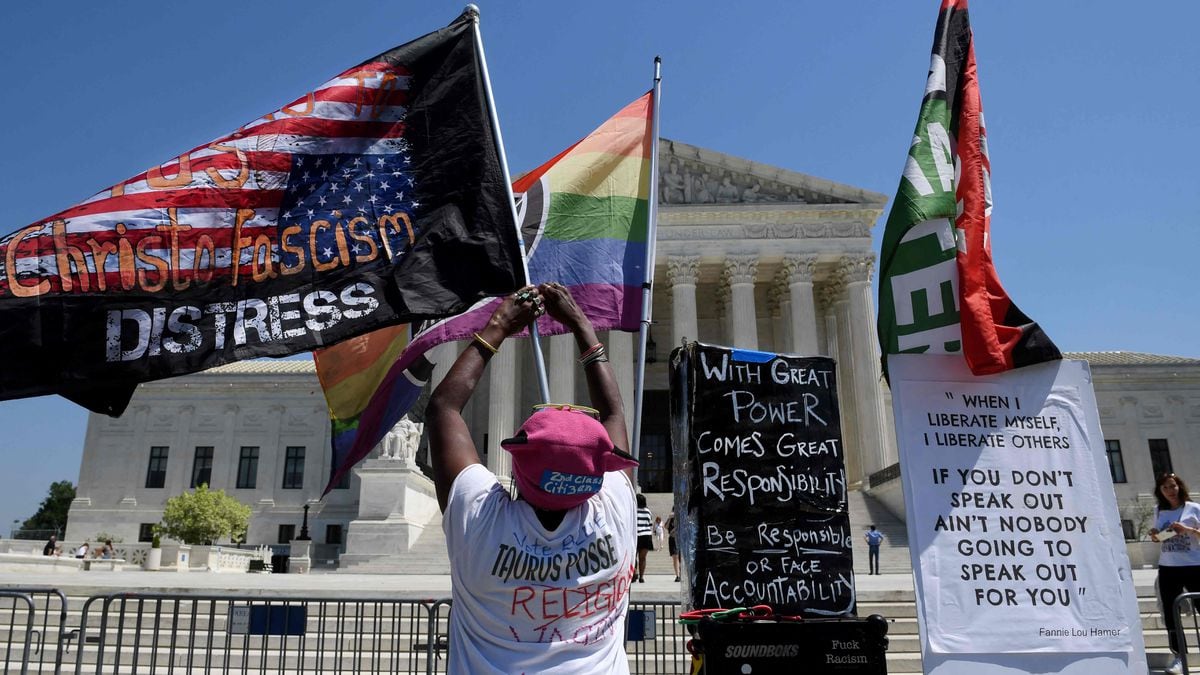50 years ago women in the United States won a constitutional right that was taken from them last year.
The right to abortion, which on January 22, 1973 was framed in the Constitution by the Supreme Court in the decision of the historic case
Roe v.
Wade
, was repealed last June, leaving millions of women more helpless than ever when dealing with their health, their lives and that of their families.
This unleashed a cascade of new laws in different states that privilege fetuses over those who carry them, and this has led to countless cases in which women are denied vital health care.
[Why Latinas Are Hardest Hit by Recent US Abortion Ban: Study Provides More Details]
There's Amanda Zurawski in Texas, who was denied an abortion for a non-viable pregnancy and ended up in the intensive care unit with sepsis.
Or Nancy Davis, a mother of three from Louisiana, who was denied an abortion even though her fetus was missing part of its head.
Another Texas woman found out at 15 weeks pregnant that her fetus would not survive and she was at serious health risk, but was told she couldn't get an abortion unless she had something like liver failure or a stroke.
There's also the Wisconsin woman who had to endure 10-day bleeding after suffering an incomplete miscarriage, and the Texas doctor who was ordered not to treat an ectopic pregnancy until the fallopian tube ruptured.
In Ohio, according to affidavits from health providers, at least three patients threatened suicide after being denied an abortion.
Norma McCorvey, or 'Jane Roe' in the famous Roe v.
Wade.
The photo was taken after she admitted to falsely claiming that she was raped to circumvent existing anti-abortion laws in 1970. Cynthia Johnson / Getty Images
Stories like these are now surfacing daily after
Roe
's repeal ,
with Latinas and Black women bearing the brunt
.
A 2022 study from the University of California Los Angeles (UCLA) details why: a larger portion of them are of reproductive age than women in other groups, more of them are moving to states that restrict the most abortion, and more women of reproductive age in those states are Latina than non-Hispanic white women.
Latinas “are a unique and particularly young population, and in a post-
Roe v.
Wade
, that means that reproductive justice will be an urgent problem that women in states that restrict abortion will suffer,” Josefina Flores Morales, PhD in sociology from UCLA and lead author of that study, explained to Telemundo News.
When pregnancy can cost your life
Being pregnant, even under the best of circumstances, places harsh demands on multiple body systems.
Carrying a baby to term can be especially difficult and risky for someone with a pre-existing condition such as diabetes or heart disease, and in some cases only an abortion can save the mother's life.
Some dangerous conditions that may require abortion services include preeclampsia, ectopic pregnancy, and miscarriage.
[A report reveals that the states with the most restrictions on abortion suffer the highest maternal and infant mortality]
Currently about 700 women die each year from pregnancy-related complications in the US, according to the Centers for Disease Control and Prevention (CDC).
About 3 out of 5 of those deaths are preventable.
This is the highest maternal mortality rate of any developed country, and it is much higher for Latinas and blacks, as they face more barriers in obtaining health care.
A study last year found that states that restrict access to abortion have 62% higher rates of maternal mortality than those that allow it.
Restricting abortion is associated with worse access to medical care for pregnant women and nursing babies,
the analysis found, which in turn increases the risk of mental health problems and death.
Three states approve to modify their constitutions to guarantee the right to abortion
Nov 9, 202201:28
The risk and impact on mental health
Mental health is also pushed to the limit during pregnancy and postpartum.
About one in seven women may develop postpartum depression (PPD), according to the National Institutes of Health, but it is estimated that up to half of PPD cases go undiagnosed because of fear of stigma.
That's why for women who already suffer from serious mental health conditions, denying them to terminate a pregnancy can cost them their lives.
In fact, according to a study published in December in JAMA Psychiatry, more women commit suicide when access to abortion is limited.
[These are the laws on abortion in the rest of the world: in which countries is it easier and which are more restrictive?]
Meanwhile, those who miscarried were less likely than those who were denied the procedure to
suffer anxiety and low self-esteem later,
according to a study from the University of California San Francisco called the Turnaway Study, which followed 1,000 women over 10 years to take a closer look at the long-term consequences of an unwanted pregnancy.
Demonstration for women's right to choose about abortion in the 1970s in New York.H.
Armstrong Roberts/Classicstock/Getty Images
The effects of an unwanted motherhood on the whole family
One fact that is lost in the current politicized debate is that
more than half of those who received an abortion are already mothers,
according to the Guttmacher Institute.
And being forced to carry a pregnancy to term has countless other negative effects on the quality of life not only for the mother, but for the rest of her family.
An important factor in this is the lack of resources.
Taking less than 12 weeks off to care for a baby is associated with poorer long-term mental health
for mothers, the Turnaway Study found, but millions of women don't have the financial security or job conditions to afford it.
This remains the only industrialized nation without a federally mandated paid family leave policy, where only a quarter of workers in the country have paid family leave, according to the US Bureau of Labor Statistics.
Arizona on the brink of implementing a near-total ban on abortion
Sept.
24, 202200:25
Caring for a baby can cost more than $13,000 in the first year alone, and this, in addition to losing wages due to taking time off to recover from childbirth, can be impossible to afford for many working women, especially Latinas who have service jobs. or front line to those who can not miss.
“I don't have enough money to have a baby now” is one of the main reasons for abortion, according to studies, and more than half of those who choose to terminate a pregnancy do so to be better financially positioned before becoming mothers.
All these pressures on finances and physical and mental health make it vital for a pregnant woman to have a support network, be it family, friends or a partner.
This is not possible for many, and in fact another main reason that women gave in surveys for terminating a pregnancy was
“not wanting to be a single mother”
.
The fear of facing this challenge alone is so great that, according to the Turnaway Study, women who are denied abortions are
more likely to remain tied to abusive partners.
Abuse is sometimes the very cause of the pregnancy that you want to terminate, and not being able to do so is not only adding salt to the wound, but another new trauma that can be much greater.
About 1% of women who abort became pregnant through rape, and less than 0.5% of women who abort became pregnant through incest, according to Guttmacher's surveys.
And while these aren't common reasons for terminating a pregnancy, they were once widely accepted as legal exceptions to abortion, even by Republicans.
Now, more and more laws and propositions do not accept them either.





/cloudfront-eu-central-1.images.arcpublishing.com/prisa/JKNMV5QC6BOTHMYCTVK4JK4J7I.jpg)
/cloudfront-eu-central-1.images.arcpublishing.com/prisa/3F3EHAP7NYDCD7NIOIZLOQJFPI.jpg)






/cloudfront-eu-central-1.images.arcpublishing.com/prisa/KMEYMJKESBAZBE4MRBAM4TGHIQ.jpg)

